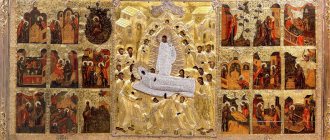History of the image of the Most Holy Theotokos Tenderness
Initially, the shrine was made on canvas mounted on a cypress board. This image was especially revered by the monk Seraphim of Sarov, who knew how to see the soul of every person and ask for healing for everyone. He prayed before this face most often, with his hands raised to heaven. The saint lived a long life and ended his earthly journey in prayer before the image of the Protectress. Seraphim bequeathed this face to the Diveyevo temple, located not far from his monastery.
Interesting! Lamp oil burning near the image of the Virgin Mary acquired healing properties. Saint Seraphim often used this divine remedy to save many unfortunate people from various ailments.
Patriarch Alexei II of Moscow received the “Tenderness” in 1991. The Holy Image of the Mother of God was placed in the patriarchal monastery. Every year the image is brought for veneration to the Epiphany Cathedral, which can accommodate a large number of believers.
This day is considered a holiday: the clergy dress in appropriate clothes and perform a solemn service. On the days of December 22, August 1 and August 10, in monasteries you need to light candles in front of the Virgin Mary with a request for the health of loved ones, and also sing an akathist (praise choir). The icon of the Mother of God “Tenderness” is designed to instill meekness and spiritual humility in all parishioners.
“Tenderness” SERAFIMO-DIVEEVSKAYA
How does godly tenderness differ from godly tenderness?
Tenderness, like many other human feelings, in a moral sense can have both good and bad content.
During the Old Testament, for many representatives of Israel, due to the coarsness of their hearts, godly tenderness was something not very familiar and not very understandable.
Educating and educating the chosen people, reminding them of what their mission and their chosenness were, God turned them away from the temptations of paganism, allowed disasters, sent down punishments, and through this contributed (including) to arousing tenderness in them (cf.: “He showed Thou art cruel to thy people: thou hast given us to drink the wine of tenderness” (Ps. 59:5)).
Preparing Israel for the coming meeting with Christ, God promised through the prophet that with the Coming of the Messiah, He would send the spirit of grace and tenderness to the house of His servant, David. Under the influence of this gracious feeling, even many of those who participated in His execution and murder should have believed in Christ (Zech. 12:10).
During the New Testament, tenderness as a feeling based on the joy of communication with God, reverence and humility before Him as the Heavenly Lord, to one degree or another became available to all true believers Christians. However, in order to comprehend this state in depth, a lot of effort is required from the ascetic.
One of the most important means to achieve this state is cutting off the sinful will, detachment from the vanity of the world, sincere prayer, participation in the Sacraments, obedience and trust in God.
If a person does not live in accordance with the moral law, and does not even believe in God and His purifying Providence, tenderness is also possible, for example, tenderness before idols, tenderness caused by an impulse of certain passions (for example, a love passion or a passion for acquisitiveness).
Such tenderness can further alienate a person from God, cultivate in him an addiction (to the object of tenderness) or intensify an already burning passion, subordinating him to the will of evil spirits.
It is precisely this sinful form of tenderness that the apostle speaks of when he says: “God has given them the spirit of tenderness, so that eyes cannot see and ears cannot hear, even to this day” (Rom. 11:8).
St. John Climacus speaks of the “blessed joyful sadness of tenderness.” He writes: “Reflecting on the property of tenderness, I am amazed at how crying and so-called sadness contain joy and gladness, like honey is contained in a honeycomb... Such tenderness is truly a gift of the Lord... God comforts the brokenhearted in a hidden way... In the abyss of crying is found consolation, and purity of heart receives enlightenment...”
See JOY SORRY








